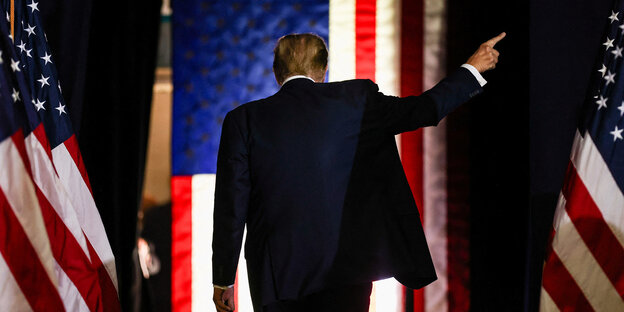Trump's announcement that Russia will be blamed for NATO members who default on their payments sounds strange. Why you still have to take them seriously.

With his back to Europe: Republican presidential candidate Donald Trump at an election rally Photo: Sam Wolfe/Reuters
Not much can be found on US presidential candidate Donald Trump's campaign page about the NATO alliance. “We must complete the process that began under my government to fundamentally reevaluate the meaning and mission of NATO,” he says, between diatribes about “globalists” (an anti-Semitic keyword) who want to drag the world into war-hating states. Joined.
They are the real enemy, not Russia, and that is why “the State Department, the defense bureaucracy, the intelligence agencies and everything else need to be completely overhauled and refounded to fire the representatives of the deep state and put America first.”
The post published in March 2023 – which also calls for an immediate ceasefire in the “proxy war” in Ukraine – is deeply rooted in right-wing conspiracy narratives that are common today and spread primarily by the Russian propaganda machine. .
Trump's comment at a campaign event in South Carolina on Saturday seems almost harmless. In a meeting, Trump said, he was once asked by the president of a NATO state that was not spending enough money on defense if the United States would protect it in the event of a Russian attack. “No, I wouldn't protect them,” Trump responded; in fact, he would “encourage Russia to do whatever it wanted.”
Pure rhetoric
Almost all observers consider that this anecdote is fictitious and that this meeting never took place. But what Trump is suggesting made people shake their heads not only around the world, but also in the United States, if only among a few Republicans.
“NATO has been a success story for 75 years,” says Trump's latest challenger for the Republican presidential nomination, former U.N. ambassador Nikki Haley, in an interview with the CBS Sunday show “Face the Nation” and warns: “Do not stand still.” on the side of a villain who murders his opponents, on the side of someone who has invaded a country, killing or injuring half a million people.”
Republican Senators Marco Rubio and Lindsay Graham, on the other hand, downplayed the claim: Trump simply wanted to reinforce the position that NATO's European partners would have to pay more. It's just Trump's rhetorical style to say it a little more drastically.
John Bolton disagrees. The veteran Republican foreign policy hardliner, who briefly served as Trump's national security adviser before the two eventually fell out, warns against taking Trump seriously. “If he says that he wants to get out of NATO, then he is a very real threat,” Bolton told MSNBC.
There is no empty noise of the electoral campaign
In fact, Trump had already flirted with a possible exit from NATO during his first election campaign in 2016. However, at several NATO summits he only caused scandalous scenes, when he furiously accused everyone else of owing a lot of money to the US. .US and sometimes left early.
Yet that is exactly what his supporters interpret as his strength today: Trump's predecessor, Barack Obama, also called for increased military spending in Europe, but was never taken seriously. Only Trump managed to get more states at least closer to the goal agreed by NATO in 2006 of spending 2 percent of gross domestic product on defense.
While Trump attempted to implement some of the campaign promises of his first presidency that many had dismissed as empty campaign noise – such as the Muslim entry ban, withdrawal from the climate agreement and construction of the wall with Mexico – he essentially left intact to NATO.
His security cabinets initially included military officials such as James Mattis or figures from the former Republican foreign and defense policy establishment, who have now almost all moved away from Trump.
More powerful and more radical
After his 2016 election victory, which was a surprise even to himself, Trump still had to fight to truly take the lead in the Republican Party. The process is long over: his opponents were fired, resigned, or were dismissed as a minority. If Trump secures his candidacy as dominantly as he currently appears, if he wins the election he would begin his second term with much more power than his first. And much more radical.
Since 2016, Donald Trump's positions on both domestic and foreign policy have hardened. His attempts to turn his 2020 electoral defeat into victory by putting pressure on electoral authorities, his then vice president, and Congress, even leading to a violent insurrection, have made Trump's relationship with democracy clear.
And in 2018 it was still considered a lapse when Trump, at a news conference following a summit with Russian President Vladimir Putin in Helsinki, criticized the US secret services for wrongly accusing Putin of interfering in the US election. Today something like this appears in his electoral manifesto.